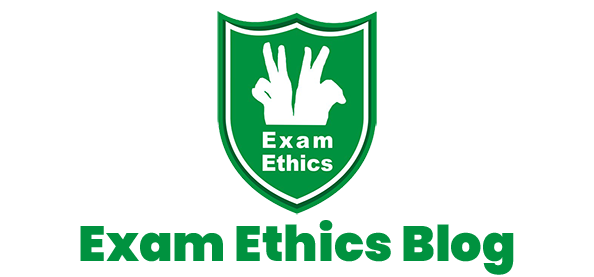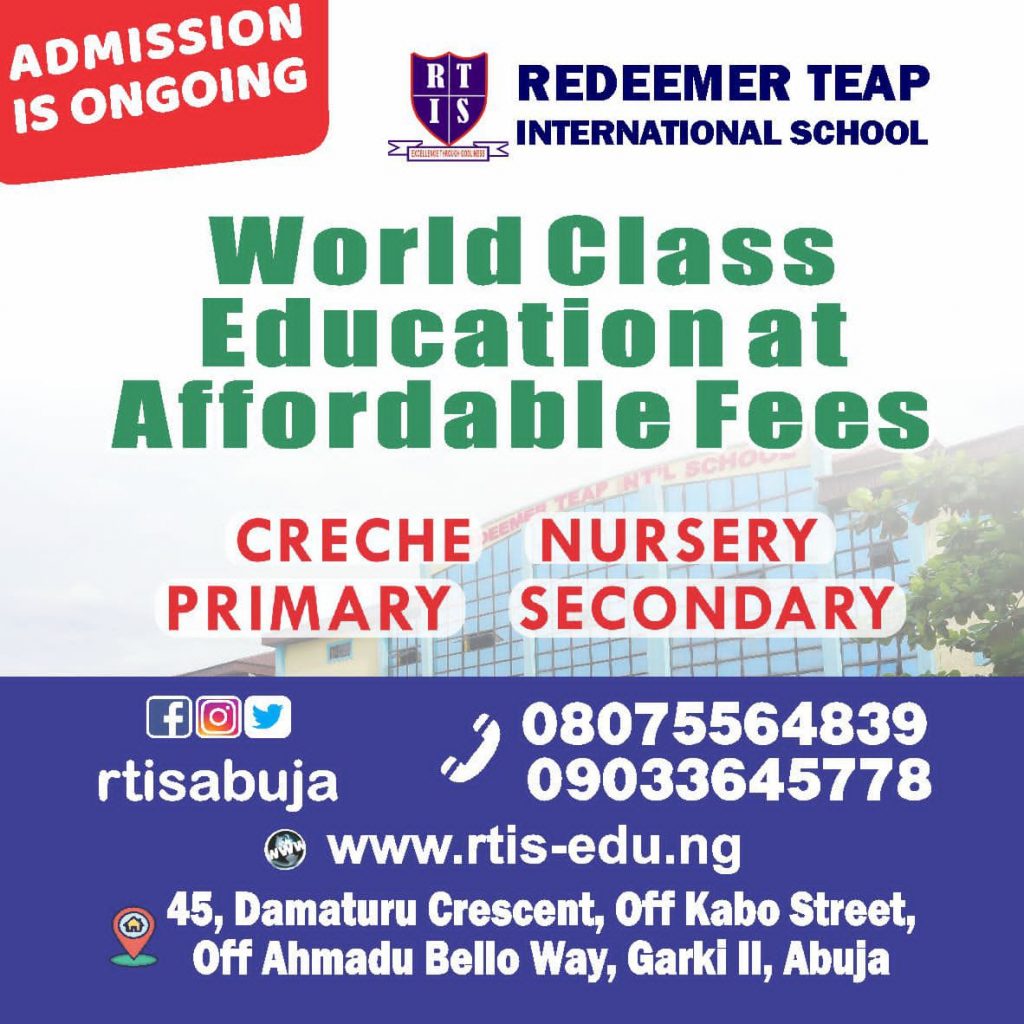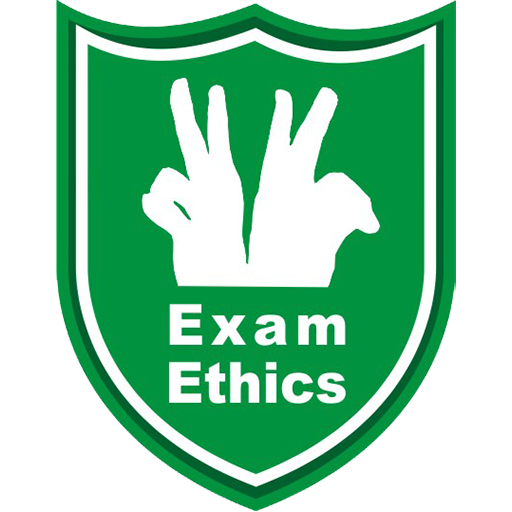20 FACTORS TO CONSIDER WHEN CHOOSING A SCHOOL FOR YOUR CHILD.
By Ike Onyechere, MFR.
***
Choosing a good school for the child is one of the most important decisions every parent must take in today’s world. It is the first step towards providing the child with solid foundation on which to build a successful future in an increasingly challenging world.
Choosing a good school requires careful and objective consideration of 20 critical factors against the background of contemporary economic, social, security, regulatory, legal and media climate. The focus is on day schools, which most parents now prefer, even as the factors also apply to boarding schools. Redeemer TEAP International School (RTIS) presents a good case study of factors discerning parents must consider.
1. CENTRAL LOCATION FOR EASY ACCESSIBILITY.
The location of the School must be such that it should be easily accessible to parents from every part of the town in which the School is situated. RTIS, for example, is a co-educational day school located at Garki 11, the centre of Abuja, the Capital City of Nigeria, which is easily accessible from all sections of Abuja,
2. All LEVELS IN ONE VICINITY.
Parents with children in different levels should consider Schools with different sections in one vicinity. RITS has its creche, nursery, primary and secondary sections in one location which makes for logistical convenience and more prudent management of time and financial resources in terms of school runs for parents.
3. QUALITY OF EDUCATION.
The School of choice for your child must offer nothing short of world class holistic academic, physical and moral education to learners. The fact cannot be over emphasized. The assumption that good schools always cost a fortune is not always correct. RTIS, for example, offers world class education anchored on the founding vision of the School as Centre of Excellence rooted in Godliness. More will be said about quality and fees as we proceed.
4. SERENE ENVIRONMENT.
A serene and conducive environment ensure effective and productive teaching and learning experience. The collapse of ethical frameworks in licensing, regulation and supervision of schools have resulted in “Schools” being located in or around wrong and noisy environments like motor parks, shopping complexes, street junctions, residential apartments, event centres etc. Schools in such locations should be avoided by discerning parents.
5. SPACIOUS PACKING SPACE.
Specious packing space within the school premises makes it easy for parents to easily and quickly drop off and pick up their wards during school runs. Almost half of the vicinity of RTIS is allocated to parking space.
6. TAILOR-MADE INFRASTRUCTURE.
School infrastructure should be top class and tailor-made for educational purposes and not just adapted for the purpose of running the school. Assess the school buildings, classrooms, administrative offices, assembly and administrative offices to ensure that they were specifically designed and developed for educational purposes. RTIS presents a good example.
7. THE QUALITY OF FACILITIES.
Ensure that the facilities, like the infrastructure, are also top class and specifically developed for educational purposes because facilities of high quality and standard facilitate effective teaching and learning outcomes. Consider the science and ICT laboratories. Music and art studios. Library, playgrounds and sporting facilities. What about the clinic and conveniences? The water supply and power systems and back-ups. Are they available? Are they well-equipped? Again RTIS is a good model
8. CURRICULUM.
Choose Schools that operate the Nigerian School Curriculum at the appropriate levels. It is alright for schools to enrich their curriculum profile with international perspectives geared towards equipping learners with knowledge, skills and the right orientation for a successful future in a globalized job market. Schools whose Unique Selling Proposition (USP) is the offer of exclusive foreign curriculum are not recommended for children’s educational foundation.
9. CO-CURRICULAR ACTIVITIES.
Co-curricular activities in schools include things like sports, clubs and societies; excursions, musical, cultural and exchange programmes; speeches, seminars, symposiums, workshops during special occasions like career and valedictory days; etc. These activities are very important for all-round development of learners. Find out whether or not co-curricular activities are reflected in the school calendar.
Ensure that the School conducts training and competitions regularly to identify, promote and sharpen talents in various sporting activities.
10. SPIRIT OF SPORTSMANSHIP AND CULTURE OF HARD WORK.
The development of diverse set of skills, building of capacity, competitions and talent identification embodied in academic and co-curricular activities should usually be geared towards developing the spirit of sportsmanship in learners; towards teaching them that individuals and society as a whole benefit from the mutual quest for excellence; and that excellence is achieved through hard work.
These are the constituent ingredients for developing children to aim high, to be ambitious and to think about making impact on a global scale, to be listed among the world’s great leaders in their chosen professions. RTIS scores high in this regard. Choose a school that pays attention to development of the culture of hard work and the spirit of sportsmanship in learners.
Schools with USP of 100% pass rate for all learners irrespective of individual abilities and work rate are not recommended.
11. DEPLOYMENT OF EDUCATIONAL TECHNOLOGY.
Deployment of educational technology platforms including automated School Management Systems aids efficient implementation of academic and administrative processes. This makes the conduct of academic, administrative and financial transactions seamless and easy for schools and parents. Besides, good and pro-active schools must gravitate towards on-line learning platforms in today’s educational climate.
12. SAFETY AND SECURITY.
Nothing should be more important to a parent than the safety and security of the child in today’s security environment. And nothing should be more important to a School than the safety and security of learners, parents, staff and the school environment. Parents must ask about the safe school protection, prevention, and precautionary measures and programmes in the School. Such programmes and measures are usually not for public analysis in media platforms. However, the initiative of organizing regular Safe School Consultative Forum for Parents and Staff by RTIS is recommended.
The event ensures that parents and staff are kept up-to-date with information on precautions, with knowledge to refocus safe school orientation programmes for learners, and to secure the buy-in of parents for safe school programmes.
13. AFFORDABLE FEES.
Parents should choose schools that are being operated based on the vision of providing education as a social responsibility initiative and not as profit making venture; a vision of building solid foundation of exceptional ethical, moral, character and academic excellence necessary for success; of Godliness. This is the founding vision of RTIS. And this is why the School operates a deliberate policy of providing world class education at low, affordable school fees complimented with targeted scholarship grants to disadvantaged children. This provides opportunity for children of all socioeconomic levels especially those with circumstances that offer on chance of accessing quality private school education. There are Schools like this across the country. Parents should invest the effort to seek them out.
14. UP-TO-DATE LICENSES AND PERMITS.
Investigate to ensure that your choice of School for your child possesses all required licenses and permits for school operations, dutifully updated as and when due. This can easily be verified from relevant government licensing and regulatory agencies.
15. REGULATORY OVERSIGHT.
Choose Schools that work with all regulatory agencies and examination boards for regular independent audit of school environment and activities. This is a mark of confidence that the School is in compliance with statutory and operational requirements and guidelines.
16. HIGH PERFORMANCE STAFF.
At the core of all high performance schools is a motivated and committed team of Management and Staff. This is fundamental because running a good school is a complex, difficult, detail-oriented job that requires full concentration and unalloyed commitment of Management and Staff. This is because Schools must be right in terms of avoiding the economic, social, security, regulatory, legal and publicity land mines ALL THE TIME to remain afloat. While a School has to step on just ONE existential economic, social, security, regulatory and legal landmine ONLY ONCE to go out of existence.
Choose schools that employ staff through rigorous recruitment, vetting and verification processes. Choose a School where Management and Staff understand that the privilege of being involved in the mission of building sound educational foundation of future generation of leaders comes with the obligation of leading by example in terms of discipline and moral and ethical values.
17. ADHERENCE TO VALUES, RULES AND REGULATIONS.
The connecting thread for all activities in a good School is adherence to established values, rules and regulations by all members of the school community including staff and learners, courageously enforced without discrimination, without fear or favour.
18. PARTNERSHIP WITH PARENTS.
Choose Schools that maintain good working partnership relationship with parents; that listen to parents towards enhancing and facilitating compliance to established rules and regulations towards sustained maintenance of discipline in the School.
19. OUTCOMES.
As the saying goes, the taste of the pudding is in the eating. The impact of the factors listed above should be reflected in the performance of the learners in external exit examinations like Basic Education Certificate and Senior Secondary Certificate Examinations based on ethics-compliant principles.
20. AWARDS.
Also confirm what level of awards the School has won in various areas of academic and sporting activities.
RTIS is used as just one case study and model for this analysis for practical illustration and verification of the factors. There are many other good Schools. Subsequent installments on the series of how to choose a good school for your child will use other good schools as case studies.
****
About the Author.
Ike Onyechere, MFR, is a philanthropist; award-winning advocate of Exam Ethics and Safe Schools; Chairman of Exam Ethics Marshals International and Ethics Resource Centre Nigeria. He is the author of 20 books focused on promoting best practices in education including Exam Ethics Manual, Safe School Manual, Excel Handbook for Students, Campus Sense, Letter from Necropolis, Defending Integrity of Education, etc.









